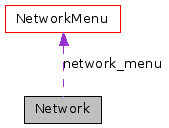
#include <network.h>
Collaboration diagram for Network:

Definition at line 37 of file network.h.
| NETWORK_NOT_CONNECTED | |
| NETWORK_OPTION_SCREEN | |
| NETWORK_INIT_GAME | |
| NETWORK_READY_TO_PLAY | |
| NETWORK_PLAYING |
Definition at line 62 of file network.h.
00063 { 00064 NETWORK_NOT_CONNECTED, 00065 NETWORK_OPTION_SCREEN, 00066 NETWORK_INIT_GAME, 00067 NETWORK_READY_TO_PLAY, 00068 NETWORK_PLAYING 00069 } network_state_t;
| Network::Network | ( | ) |
Definition at line 45 of file network.cpp.
00046 { 00047 max_player_number = 0; 00048 m_is_connected = false; 00049 m_is_server = false; 00050 m_is_client = false; 00051 state = NETWORK_NOT_CONNECTED; 00052 inited = false; 00053 sync_lock = false; 00054 network_menu = NULL; 00055 00056 //Set nickname 00057 #ifdef WIN32 00058 nickname = getenv("USERNAME"); 00059 #else 00060 nickname = getenv("USER"); 00061 #endif 00062 }
| Network::~Network | ( | ) |
Definition at line 92 of file network.cpp.
00093 { 00094 Disconnect(); 00095 if(inited) 00096 { 00097 SDLNet_Quit(); 00098 #if defined(DEBUG) && not defined(WIN32) 00099 close(fin); 00100 close(fout); 00101 #endif 00102 } 00103 }
Here is the call graph for this function:

| void Network::AcceptIncoming | ( | ) |
Definition at line 234 of file network.cpp.
00235 { 00236 assert(m_is_server); 00237 if(state != NETWORK_OPTION_SCREEN) return; 00238 00239 server_socket = SDLNet_TCP_Open(&ip); 00240 if(!server_socket) 00241 { 00242 Question question; 00243 question.Set(_("Unable to listen for client!"),1,0); 00244 question.Ask(); 00245 printf("SDLNet_ResolveHost: %s\n", SDLNet_GetError()); 00246 return; 00247 } 00248 printf("\nStart listening"); 00249 }
Here is the call graph for this function:
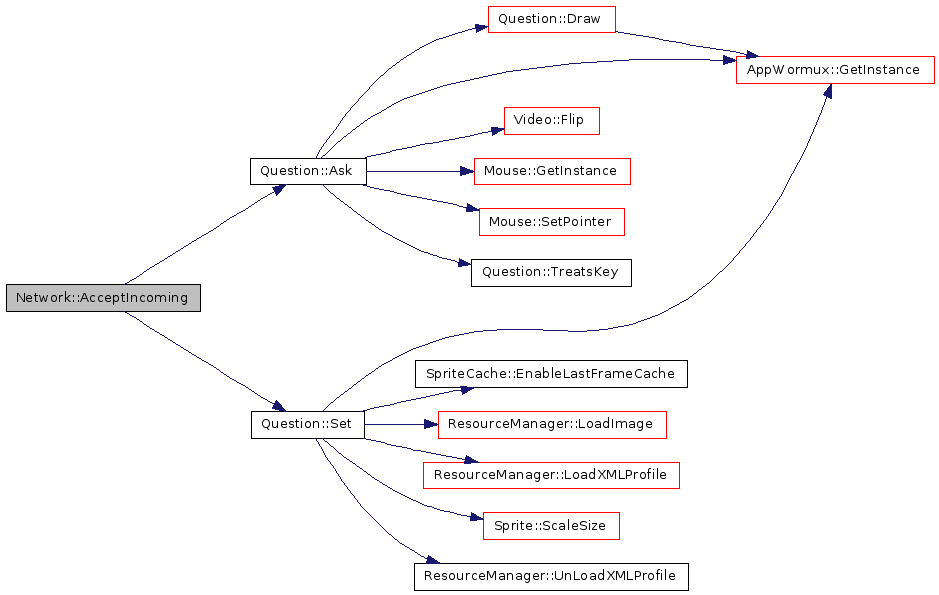
Here is the caller graph for this function:

| void Network::ClientConnect | ( | const std::string & | host, | |
| const std::string & | port | |||
| ) |
Definition at line 134 of file network.cpp.
00135 { 00136 MSG_DEBUG("network", "Client connect to %s:%s", host.c_str(), port.c_str()); 00137 00138 int prt=0; 00139 sscanf(port.c_str(),"%i",&prt); 00140 prt = htons(prt); 00141 00142 if(SDLNet_ResolveHost(&ip,host.c_str(),prt)==-1) 00143 { 00144 Question question; 00145 question.Set(_("Invalid server adress!"),1,0); 00146 question.Ask(); 00147 printf("SDLNet_ResolveHost: %s\n", SDLNet_GetError()); 00148 return; 00149 } 00150 00151 ip.port = prt; 00152 00153 TCPsocket socket = SDLNet_TCP_Open(&ip); 00154 00155 if(!socket) 00156 { 00157 Question question; 00158 question.Set(_("Unable to contact server!"),1,0); 00159 question.Ask(); 00160 printf("SDLNet_ResolveHost: %s\n", SDLNet_GetError()); 00161 return; 00162 } 00163 00164 m_is_client = true; 00165 m_is_server = false; 00166 state = NETWORK_OPTION_SCREEN; 00167 m_is_connected = true; 00168 00169 socket_set = SDLNet_AllocSocketSet(1); 00170 connected_player = 1; 00171 cpu.push_back(new DistantComputer(socket)); 00172 //Send nickname to server 00173 Action a(Action::ACTION_NICKNAME, nickname); 00174 network.SendAction(&a); 00175 00176 //Control to net_thread_func 00177 thread = SDL_CreateThread(net_thread_func,NULL); 00178 }
Here is the call graph for this function:
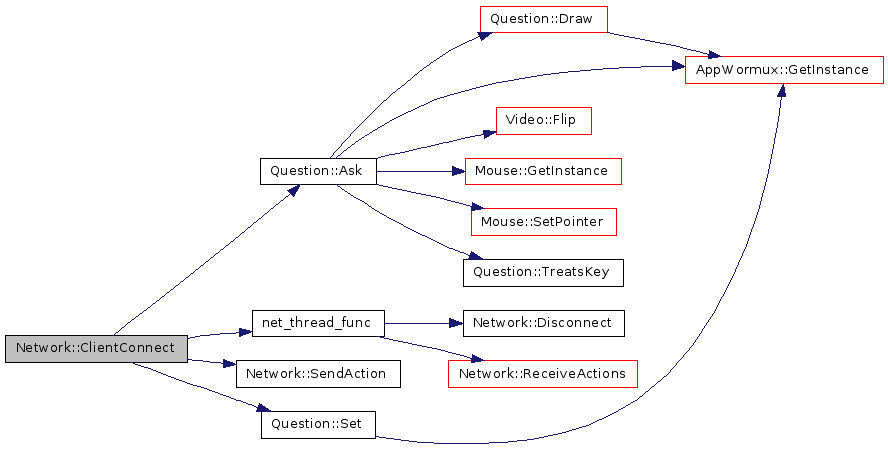
Here is the caller graph for this function:

| std::list< DistantComputer * >::iterator Network::CloseConnection | ( | std::list< DistantComputer * >::iterator | closed | ) |
Definition at line 218 of file network.cpp.
00219 { 00220 printf("Client disconnected\n"); 00221 delete *closed; 00222 if(m_is_server && connected_player == max_player_number) 00223 { 00224 // A new player will be able to connect, so we reopen the socket 00225 // For incoming connections 00226 printf("Allowing new connections\n"); 00227 AcceptIncoming(); 00228 } 00229 00230 connected_player--; 00231 return cpu.erase(closed); 00232 }
Here is the call graph for this function:

Here is the caller graph for this function:

| void Network::Disconnect | ( | ) |
Definition at line 107 of file network.cpp.
00108 { 00109 if(!m_is_connected) return; 00110 00111 m_is_connected = false; // To make the threads terminate 00112 00113 SDL_WaitThread(thread,NULL); 00114 printf("Network thread finished\n"); 00115 for(std::list<DistantComputer*>::iterator client = cpu.begin(); 00116 client != cpu.end(); 00117 client++) 00118 { 00119 delete *client; 00120 } 00121 cpu.clear(); 00122 SDLNet_FreeSocketSet(socket_set); 00123 00124 if(m_is_server) 00125 SDLNet_TCP_Close(server_socket); 00126 00127 m_is_server = false; 00128 m_is_client = false; 00129 }
Here is the caller graph for this function:

| const uint Network::GetPort | ( | ) | const |
Definition at line 414 of file network.cpp.
00414 { return ntohs(ip.port); }
Here is the caller graph for this function:

| void Network::Init | ( | ) |
Definition at line 74 of file network.cpp.
00075 { 00076 if(inited) return; 00077 if (SDLNet_Init()) { 00078 Error(_("Failed to initialize network library!")); 00079 } 00080 inited = true; 00081 max_player_number = GameMode::GetInstance()->max_teams; 00082 connected_player = 0; 00083 00084 #if defined(DEBUG) && not defined(WIN32) 00085 fin = open("./network.in", O_RDWR | O_CREAT | O_SYNC, S_IRWXU | S_IRWXG); 00086 fout = open("./network.out", O_RDWR | O_CREAT | O_SYNC, S_IRWXU | S_IRWXG); 00087 #endif 00088 }
Here is the call graph for this function:

Here is the caller graph for this function:

| const bool Network::IsClient | ( | ) | const |
Definition at line 413 of file network.cpp.
00413 { return m_is_client; }
Here is the caller graph for this function:
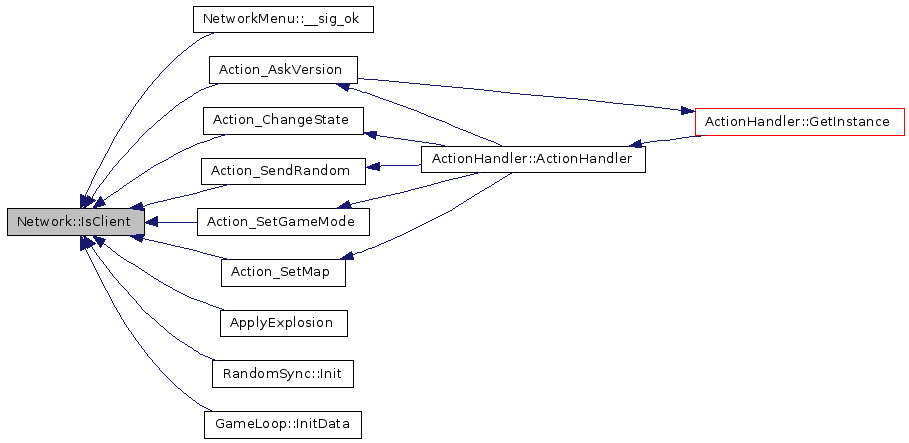
| const bool Network::IsConnected | ( | ) | const |
Definition at line 410 of file network.cpp.
00410 { return m_is_connected; }
Here is the caller graph for this function:
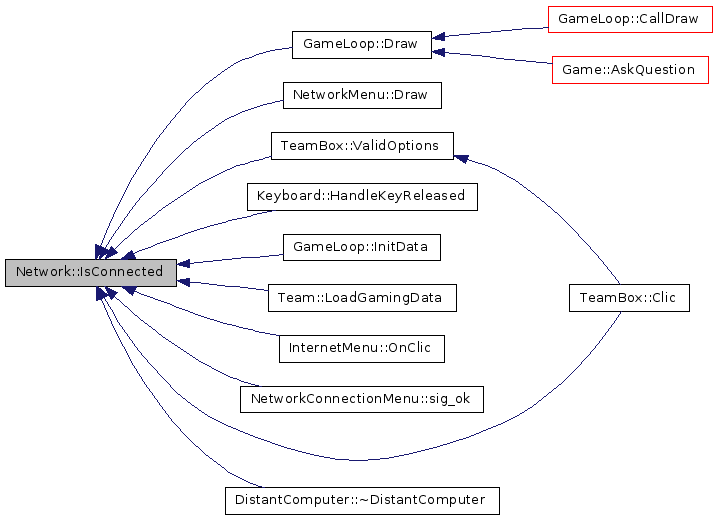
| const bool Network::IsLocal | ( | ) | const |
Definition at line 411 of file network.cpp.
00411 { return !m_is_server && !m_is_client; }
Here is the caller graph for this function:
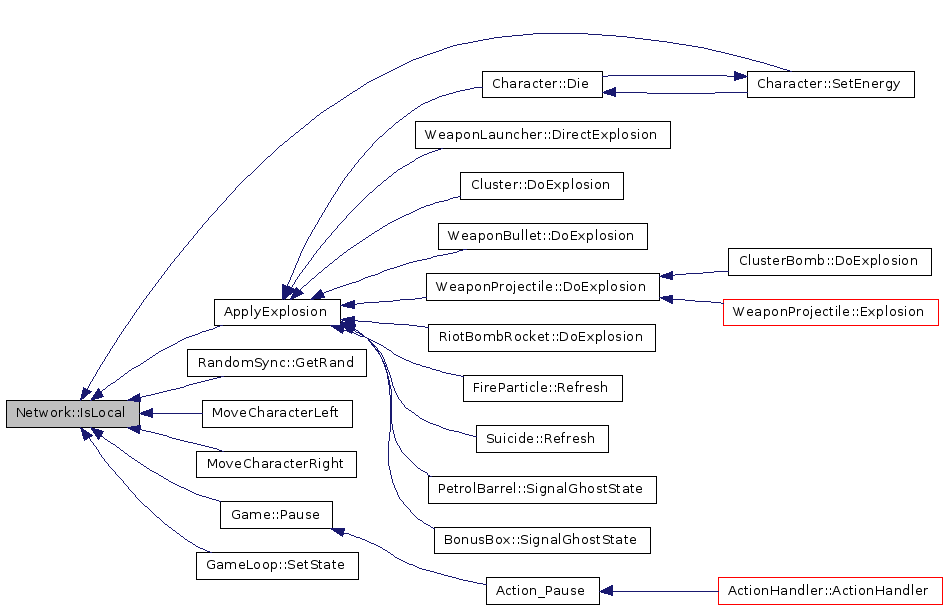
| const bool Network::IsServer | ( | ) | const |
Definition at line 412 of file network.cpp.
00412 { return m_is_server; }
Here is the caller graph for this function:
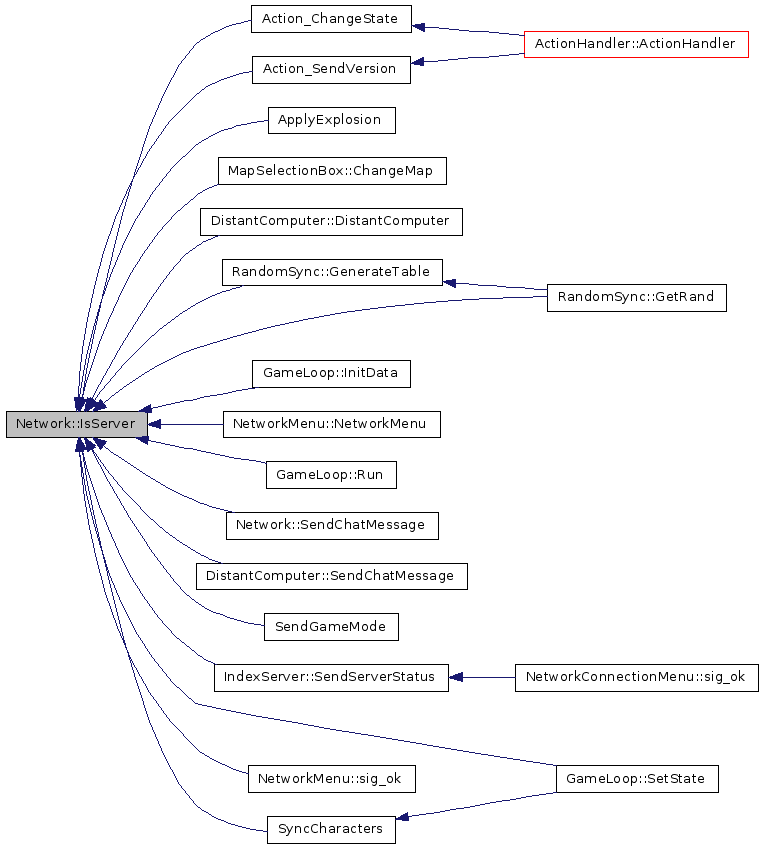
| void Network::ReceiveActions | ( | ) |
Definition at line 263 of file network.cpp.
00264 { 00265 char* packet; 00266 00267 while(m_is_connected && (cpu.size()==1 || m_is_server)) 00268 { 00269 if(state == NETWORK_PLAYING && cpu.size() == 0) 00270 { 00271 // If while playing everybody disconnected, just quit 00272 break; 00273 } 00274 00275 while(SDLNet_CheckSockets(socket_set, 100) == 0 && m_is_connected) //Loop while nothing is received 00276 if(m_is_server && server_socket) 00277 { 00278 // Check for an incoming connection 00279 TCPsocket incoming; 00280 incoming = SDLNet_TCP_Accept(server_socket); 00281 if(incoming) 00282 { 00283 cpu.push_back(new DistantComputer(incoming)); 00284 connected_player++; 00285 printf("New client connected\n"); 00286 if(connected_player >= max_player_number) 00287 RejectIncoming(); 00288 ActionHandler::GetInstance()->NewAction(new Action(Action::ACTION_ASK_VERSION)); 00289 } 00290 } 00291 00292 std::list<DistantComputer*>::iterator dst_cpu = cpu.begin(); 00293 while(dst_cpu != cpu.end() && m_is_connected) 00294 { 00295 if((*dst_cpu)->SocketReady()) // Check if this socket contains data to receive 00296 { 00297 // Read the size of the packet 00298 int packet_size = (*dst_cpu)->ReceiveDatas(packet); 00299 if( packet_size <= 0) 00300 { 00301 dst_cpu = CloseConnection(dst_cpu); 00302 continue; 00303 } 00304 00305 #if defined(DEBUG) && not defined(WIN32) 00306 int tmp = 0xFFFFFFFF; 00307 write(fin, &packet_size, 4); 00308 write(fin, packet, packet_size); 00309 write(fin, &tmp, 4); 00310 #endif 00311 00312 Action* a = new Action(packet); 00313 MSG_DEBUG("network.traffic","Received action %s", 00314 ActionHandler::GetInstance()->GetActionName(a->GetType()).c_str()); 00315 00316 //Add relation between nickname and socket 00317 if( a->GetType() == Action::ACTION_NICKNAME){ 00318 std::string nickname = a->PopString(); 00319 std::cout<<"New nickname: " + nickname<< std::endl; 00320 (*dst_cpu)->nickname = nickname; 00321 delete a; 00322 break; 00323 } 00324 00325 if( a->GetType() == Action::ACTION_NEW_TEAM 00326 || a->GetType() == Action::ACTION_DEL_TEAM) 00327 { 00328 (*dst_cpu)->ManageTeam(a); 00329 delete a; 00330 } 00331 else 00332 if(a->GetType() == Action::ACTION_CHAT_MESSAGE) 00333 { 00334 (*dst_cpu)->SendChatMessage(a); 00335 delete a; 00336 } 00337 else 00338 { 00339 ActionHandler::GetInstance()->NewAction(a, false); 00340 } 00341 00342 // Repeat the packet to other clients: 00343 if(a->GetType() != Action::ACTION_SEND_VERSION 00344 && a->GetType() != Action::ACTION_CHANGE_STATE 00345 && a->GetType() != Action::ACTION_CHAT_MESSAGE) 00346 for(std::list<DistantComputer*>::iterator client = cpu.begin(); 00347 client != cpu.end(); 00348 client++) 00349 if(client != dst_cpu) 00350 { 00351 (*client)->SendDatas(packet, packet_size); 00352 } 00353 free(packet); 00354 } 00355 dst_cpu++; 00356 } 00357 } 00358 Game::GetInstance()->SetEndOfGameStatus( true ); 00359 }
Here is the call graph for this function:
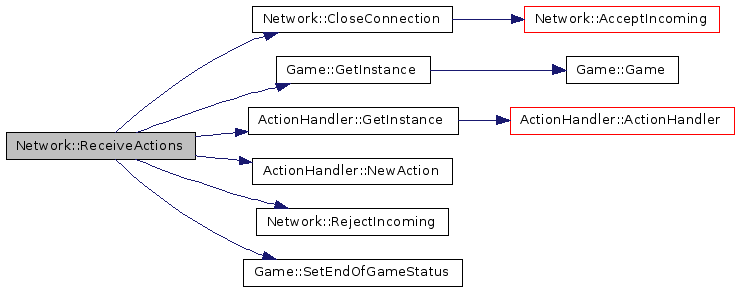
Here is the caller graph for this function:

| void Network::RejectIncoming | ( | ) |
Definition at line 251 of file network.cpp.
00252 { 00253 assert(m_is_server); 00254 if(!server_socket) return; 00255 SDLNet_TCP_Close(server_socket); 00256 server_socket = NULL; 00257 printf("\nStop listening"); 00258 }
Here is the caller graph for this function:

| void Network::SendAction | ( | Action * | action | ) |
Definition at line 362 of file network.cpp.
00363 { 00364 if (!m_is_connected) return; 00365 00366 MSG_DEBUG("network.traffic","Send action %s", 00367 ActionHandler::GetInstance()->GetActionName(a->GetType()).c_str()); 00368 00369 int size; 00370 char* packet; 00371 a->WritePacket(packet, size); 00372 00373 assert(*((int*)packet) != 0 ); 00374 SendPacket(packet, size); 00375 00376 free(packet); 00377 }
Here is the call graph for this function:

Here is the caller graph for this function:
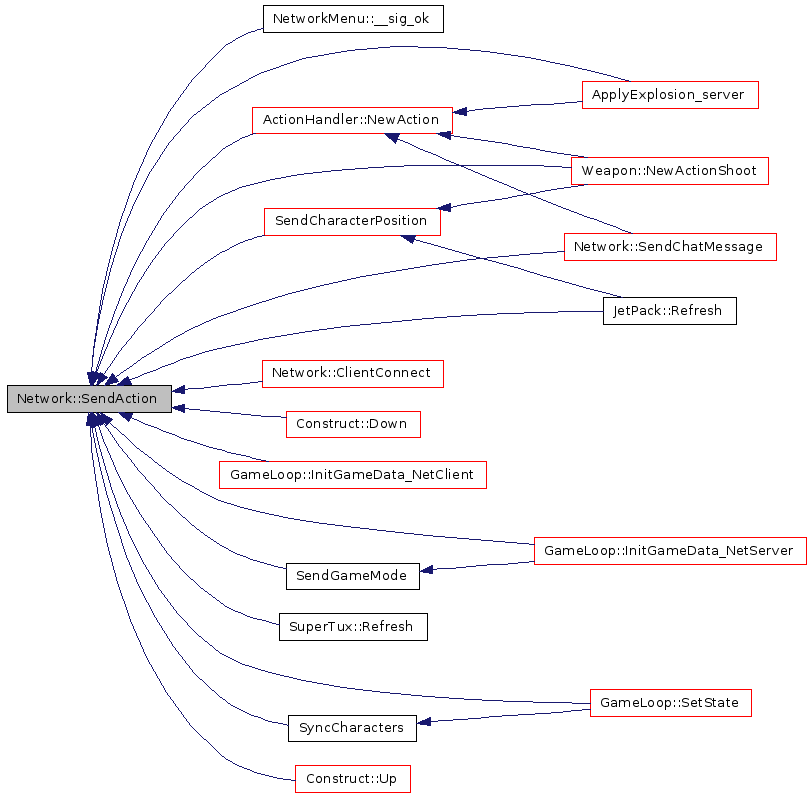
| void Network::SendChatMessage | ( | std::string | txt | ) |
Definition at line 395 of file network.cpp.
00396 { 00397 if(IsServer()) 00398 { 00399 ActionHandler::GetInstance()->NewAction(new Action(Action::ACTION_CHAT_MESSAGE, nickname + std::string("> ") + txt)); 00400 } 00401 else 00402 { 00403 Action a(Action::ACTION_CHAT_MESSAGE, txt); 00404 network.SendAction(&a); 00405 } 00406 }
Here is the call graph for this function:

Here is the caller graph for this function:

| void Network::SendPacket | ( | char * | packet, | |
| int | size | |||
| ) |
Definition at line 379 of file network.cpp.
00380 { 00381 #if defined(DEBUG) && not defined(WIN32) 00382 int tmp = 0xFFFFFFFF; 00383 write(fout, &size, 4); 00384 write(fout, packet, size); 00385 write(fout, &tmp, 4); 00386 #endif 00387 for(std::list<DistantComputer*>::iterator client = cpu.begin(); 00388 client != cpu.end(); 00389 client++) 00390 { 00391 (*client)->SendDatas(packet, size); 00392 } 00393 }
Here is the caller graph for this function:
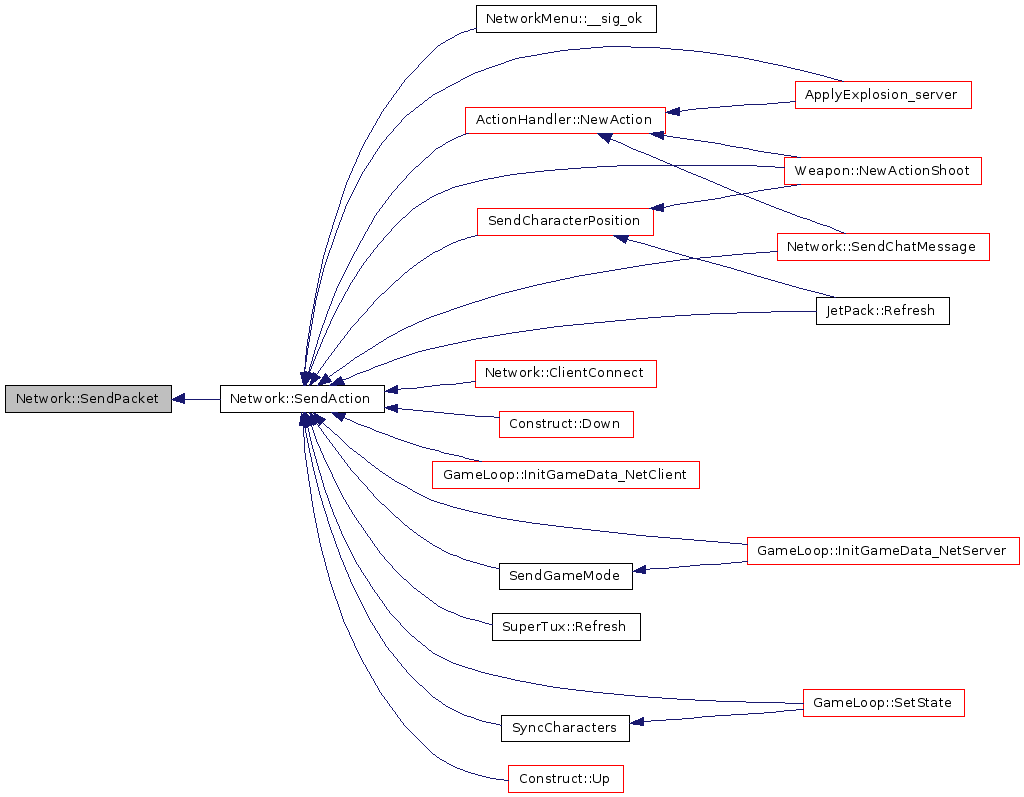
| void Network::ServerStart | ( | const std::string & | port | ) |
Definition at line 184 of file network.cpp.
00185 { 00186 // The server starts listening for clients 00187 MSG_DEBUG("network", "Start server on port %s", port.c_str()); 00188 00189 cpu.clear(); 00190 // Convert port number (std::string port) into SDL port number format: 00191 int prt; 00192 sscanf(port.c_str(),"%i",&prt); 00193 prt = htons(prt); 00194 00195 if(SDLNet_ResolveHost(&ip,NULL,prt)==-1) 00196 { 00197 Question question; 00198 question.Set(_("Invalid port!"),1,0); 00199 question.Ask(); 00200 printf("SDLNet_ResolveHost: %s\n", SDLNet_GetError()); 00201 return; 00202 } 00203 ip.port = prt; 00204 00205 m_is_server = true; 00206 m_is_client = false; 00207 m_is_connected = true; 00208 00209 // Open the port to listen to 00210 state = NETWORK_OPTION_SCREEN; 00211 AcceptIncoming(); 00212 connected_player = 1; 00213 printf("\nConnected\n"); 00214 socket_set = SDLNet_AllocSocketSet(GameMode::GetInstance()->max_teams); 00215 thread = SDL_CreateThread(net_thread_func,NULL); 00216 }
Here is the call graph for this function:
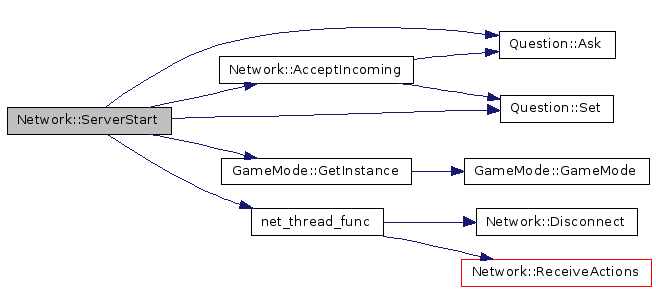
Here is the caller graph for this function:

friend class DistantComputer [friend] |
| std::list<DistantComputer*> Network::cpu |
bool Network::inited [private] |
IPaddress Network::ip [protected] |
bool Network::m_is_client [protected] |
bool Network::m_is_connected [protected] |
bool Network::m_is_server [protected] |
| std::string Network::nickname |
TCPsocket Network::server_socket [protected] |
SDLNet_SocketSet Network::socket_set [protected] |
| bool Network::sync_lock |
SDL_Thread* Network::thread [protected] |
 1.4.7
1.4.7